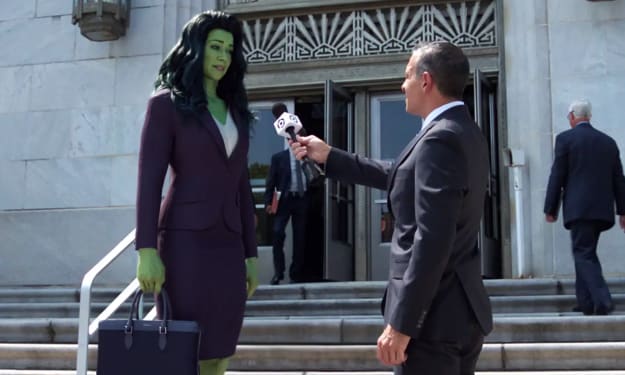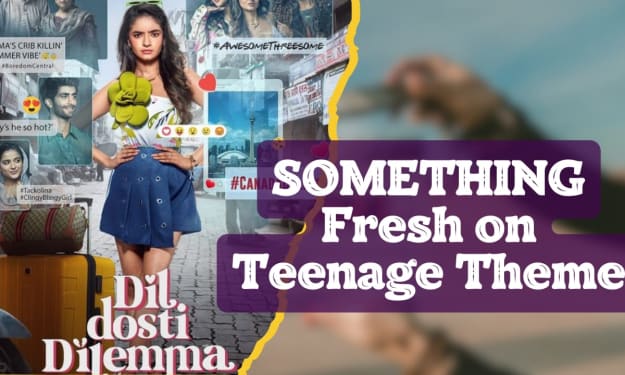Pop Culture's Reckoning with "Wage Slavery"
Breaking down the media's examination of capitalist exploitation

A lot of people hate work. "Work is not my highest priority and never will be," rants a user on r/Jobs. "I don't hate my job; I actually enjoy it. However, I'm just sick of this western(?) idea that your work is your identifier and needs to be your 'highest priority.'" This is a common perspective (see also my article You Are Not Crazy for Hating the Idea of Work).
Pop culture has always reflected these anti-work sentiments on the screen. We can go back as earlier as Fritz Lang's 1927 film Metropolis where the rich live in luxury while workers toil away at a great machine that underpins their entire society. Metropolis depicts industrialization, not as a freeing force, but one that creates an economic underclass based on subjugation (why does that sound so familiar?).
In contemporary times, there has been an explosion of films, shows, and books that don't just criticize bad jobs but the state of work in general. We have seen titles emerge that claim that work is slowly making "wage slaves" of us all.
Pop Culture Tackles Wage Slavery
"Wage Slavery" is a pejorative term about the inequitable nature of wage labor. There's a lot of controversy about this term (and if you want to learn more, check out A Brief Primer on What Wage Slavery Means). The Wikipedia version is that critics of wage labor believe contracts between workers and capitalists are inherently exploitative because the latter party has more power in the arrangement — i.e., how can you be free to choose a job when you need its wages to not die on the street?
Now for the longest time, pop culture has loved to talk about how work sucks. The quintessential film of the early 2000s was Office Space, a workplace comedy that skewered the inefficiency and cruelty of corporate America. You can also look at the TV comedy The Office, about an inept middle manager in a dying industry, or the 2011 film Horrible Bosses.
Yet these texts, although critical of corporations, are not as explicit as some of the works we are seeing now. In recent years a lot of media has drawn upon the slavery angle explicitly. This is usually accomplished using magical realism (or when a fantastical element is introduced in an otherwise realistic setting) to highlight examples of wage labor being literal slavery.
For example, director Boots Riley's Sorry to Bother You (2018) focuses on a telemarketer named Cassius Green rising through the ranks of his predatory job. Cassius has to grabble with the reality that he is marketing labor done by "indentured servants" (i.e., slaves). A huge twist is how the evil WorryFree company is trying to turn these enslaved individuals into subhuman horse people.
Another text that links work with slavery is the show Severance (2022), which is about people who "choose" to undertake a procedure done by their employer Lumon Industries that separates their "work selves" from their "home selves." Neither an employee's "innie" nor "outie" retains the memories or experiences of the other, and it's made quite clear that "innies" have no agency in this relationship. They are enslaved people who cannot stop working unless their outie chooses to quit their job at Lumon, and in that case, the innie ceases to exist.
We could also look at the cultural phenomenon Squid Game, where contestants sign up for a deadly gameshow, with all but one making it to the end alive. The premise of an underground hunt in the style of The Most Dangerous Game is not only fantastical, but it highlights how contracts can be weaponized. The characters in the Squid Game have no agency. Where they go, and even if they live or die, is all decided by another person, but they technically choose to be there, literally signing a contract. It is wage slavery in the truest sense of the word.
Even director Bong Joon-ho's film Parasite (2019), a movie about the Kim family taking on traditional "wage slave" service jobs for the upper-class Park family, has this dynamic collapse into actual slavery. Halfway through the film, it's revealed that due to a series of contrivances, a previously unknown character has been living in an underground bunker, utterly at the mercy of the rich family above him. Director Bong Joon-ho has many magical realism films that focus on capitalist exploitation underneath his belt (see also Snow Piercer, Okja, etc.).
Finally, in the realm of literature, we could look at K. M. Szpara's 2020 novel Docile, where in the not-too-far-off future, people can "choose" to sell themselves into slavery to pay off their debts. They further have the option to take a substance called Dociline that dulls their autonomy, making them more compliant. Hence the reason why they are referred to as "Dociles" in the story.
All of these texts use fantastical elements to collapse the usual justifications used to defend wage slavery — i.e., "that it's something a worker chooses." Be it Dociline or surgical compliance, we have to grabble with the extremes of how contracts can be weaponized to coerce consent. It's not realistic to claim someone is "free" if their options are not only severely limited but the ones they can take limit their autonomy even further.
Many of these characters are "choosing" these terrible options after the systems around them have given them little choice. The contestants in Squid Game all have crippling poverty that makes their life outside the games a kind of hell (note — this is the name of the only episode that takes place outside the games). The Kim family in Parasite is living in squalid poverty, which incentivizes them to take on tasks (and bend morals) that they might not otherwise care to. The people who choose to become "lifetime employees" for WorryFree in Sorry To Bother You are doing so because the company has promised to provide for their food and housing — an indication of just how terrible everything has become.
Perhaps the most dystopian is in Docile, where debts are now legally intergenerational, forcing people to pay off loans they didn't even take out. Characters may sell themselves for hundreds of thousands or even millions of dollars, all to "pay" for a fraction of this debt, while the mere fact that they are alive further compounds the debt they must take out.
Sometimes the reasons for this "willful" slavery are not (just) about money but how capitalism atomizes people in a way that makes us feel alienated from systems of support. Protagonist Mark's main reason for undergoing the Severance procedure is not because he needs the money — although that doesn't hurt — but because he doesn't want to feel anything following the alleged death of his wife. A predatory company was allowed to give an unstable man an experimental and controversial medical procedure — all because our system doesn't give hurt people like Mark the tools and resources they need to process grief.
Conclusion
From Sorry to Bother You to Docile to Severance, these works of media represent an explosion of works that examine capitalism's coercive ability to weaponize "consent" and, arguably, to create a system of literal slavery. And, of course, I left out many examples (see also Get Out, You, etc.). You can call the contracts drawn out in these works "fair," but doing so delusionally ignores the inequitable power dynamics between the person writing the contract and the signee, who is desperate for money to survive — a reality that feels all too real. As I write in my own review of Severance:
“The scariest thing about Severance is how unsurprising this entire setup is. There are a lot of surreal elements on this show: workers spend hours editing emotions out of a document, there is a department devoted to nursing goats, and workers who meet their numbers are rewarded with a BDSM waffle party. All of these things are off the wall, but the willingness of a company to take someone’s mind and mold it in their image is very believable. It seems only like a natural extension of the current environment.”
It's difficult to know if this trend in pop culture speaks to a change in how we view such contracts or merely a niche moment in history. While many of these pieces of media have earned accolades (Parasite earned Best Picture, after all), they by no means have the same attention as the MCU and other pop culture works. It is possible that this call in history will be unlistened to, as we further descend into a world just as aggressive as Docile or Squid Game.
If that happens, no contract will save us.
About the Creator
Alex Mell-Taylor
I write long-form pieces on timely themes inside entertainment, pop culture, video games, gender, sexuality, race and politics. My writing currently reaches a growing audience of over 10,000 people every month across various publications.






Comments
There are no comments for this story
Be the first to respond and start the conversation.